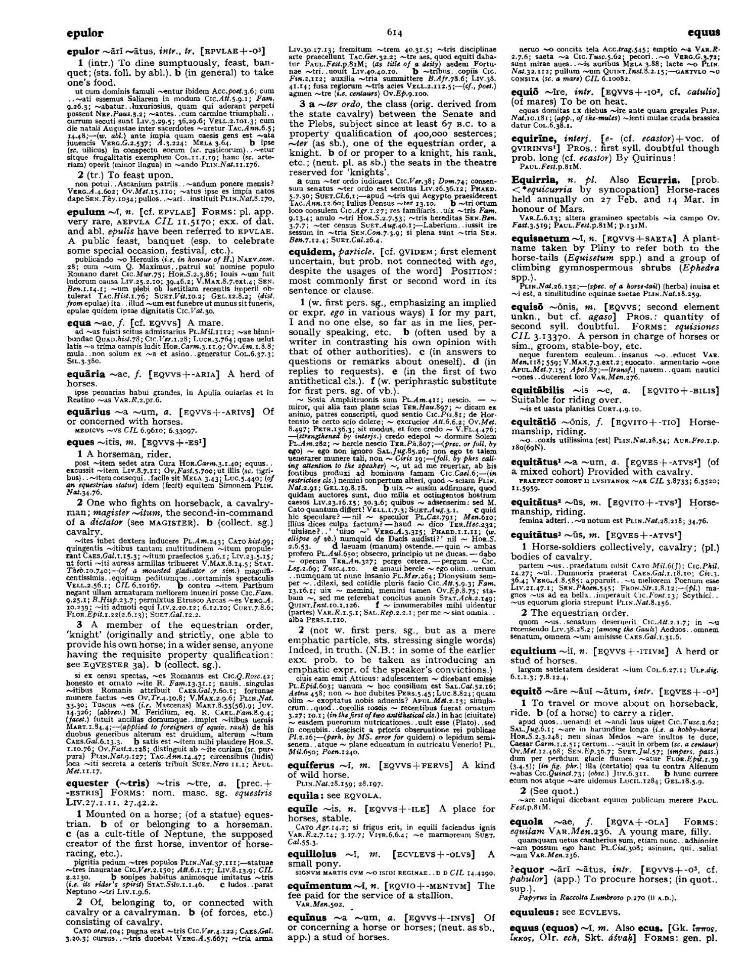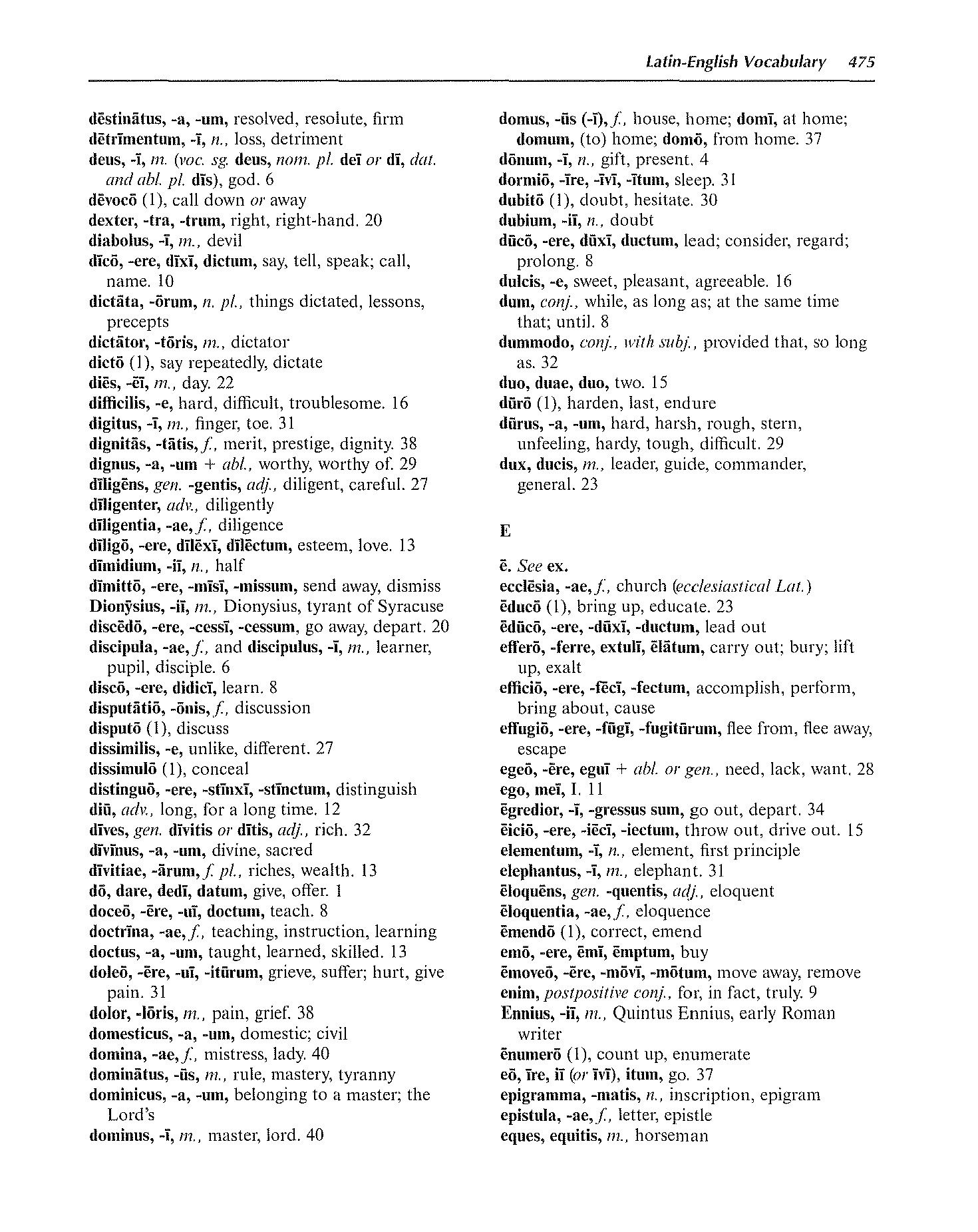
page_listing.tpl
page_subListingDetails.tpl
sub_listingDetails_style1.tpl
sub_listingDetails.title.tpl
eques horseman
eques is a Latin Noun that primarily means horseman.
Definitions for eques
Wheelock's Latin
Noun
- 1
horseman
Oxford Latin Dictionary
Noun
- 1
A horseman, rider.
- 2
One who fights on horseback, a cavalry-man; magister ~itum, the second-in-command of a dictator (see MAGISTER). (b) (collect. sg.) cavalry.
- 3
A member of the equestrian order, 'knight' (originally and strictly, one able to provide his own horse; in a wider sense, anyone having the requisite property qualification: see EQVESTER 3a). (collect. sg.).
Sentences with eques
Latin to English
Sunt Caesarī paucī equitēs.Compare Caesar has few cavalry (literally, There are few cavalry to Caesar).
Eques Romanus, vetus amicus suus, excipio, fulcio, et sustineo.Compare He received, supported and sustained a Roman knight, an old friend of his own.
Primo anceps sum pugna, nequicquam saepe conatus eques Romanus impetus turbo hostis acies.Compare The battle was at first doubtful, the Roman cavalry having made many fruitless attempts to throw the enemy's line into confusion by a charge.
Quattuor eques vita suus committo audeo.Compare He dared to entrust his life to four horsemen.
Convocatus ad concilium praefectus eques, venio tempus victoria demonstro.Compare The commanders of the cavalry having been summoned to a council, he shows that the time for victory has come.
At Romae ruere in servitium consules, patres, eques: quanto quis illustrior, tanto magis falsi ac festinantes, vultuque composito, ne laeti excessus principis, neu tristiores primordio, lacrimas, gaudium, questus adulationem miscebant.Compare Meanwhile at Rome people plunged into slavery - consuls, senators, knights. The higher a man's rank, the more eager his hypocrisy, and his looks the more carefully studied, so as neither to betray joy at the decease of one emperor nor sorrow at the rise of another, while he mingled delight and lamentations with his flattery.
Declension table for eques
Cactus2000
| Singular | Plural | |
| Nom. | eques | equitēs |
| Gen. | equitis | equitum |
| Dat. | equitī | equitibus |
| Acc. | equitem | equitēs |
| Abl. | equite | equitibus |
Data sources
Notes
- Definitions
- Frederick M. Wheelock, Wheelock's Latin, 6th ed., rev. Richard A. LaFleur (New York, NY: HarperCollins Publishers, 2005): 475.
- P. G. W. Glare, Oxford Latin Dictionary, Vols. 1-8 (Oxford: Clarendon Press, 1982): 614.
- Word frequencies
- Christopher Francese, "Latin Core Vocabulary," Dickinson College Commentaries, last modified 2014, http://dcc.dickinson.edu.
- Paul B. Diederich, The Frequency of Latin Words and Their Endings, PhD diss., (Columbia University, 1939).
- Louis Delatte, Suzanne Govaerts, Joseph Denooz, and Etienne Evrard, Dictionnaire fréquentiel et index inverse de la langue latine [Frequency Dictionary and Inverse Index of the Latin Language] (Liège, Belgium: Laboratoire d'analyse statistique des langues anciennes de l'Université de Liège [L.A.S.L.A.], 1981): 120.
Bibliography
Allen, Joseph H. Allen and Greenough's New Latin Grammar for Schools and Colleges: Founded on Comparative Grammar. Edited by James B. Greenough, George L. Kittredge, Albert A. Howard, and Benjamin L. D'Ooge. Boston, MA: Ginn & Company, 1903.
Crystal, David. A Dictionary of Linguistics and Phonetics. 6th ed. Oxford, UK: Blackwell Publishing, 2008.
Delatte, Louis, Suzanne Govaerts, Joseph Denooz, and Etienne Evrard. Dictionnaire fréquentiel et index inverse de la langue latine [Frequency Dictionary and Inverse Index of the Latin Language]. Liège, Belgium: Laboratoire d'analyse statistique des langues anciennes de l'Université de Liège (L.A.S.L.A.), 1981.
Diederich, Paul B. The Frequency of Latin Words and Their Endings. PhD diss., Columbia University, 1939.
Francese, Christopher. "Latin Core Vocabulary." Dickinson College Commentaries. Last modified 2014. http://dcc.dickinson.edu/latin-vocabulary-list.
Gildersleeve, Basil L., and Gonzales Lodge. Gildersleeve's Latin Grammar: Third Edition, Revised, and Enlarged. 3rd ed. London, England: Macmillan and Co., 1903.
Glare, Peter G.W. Oxford Latin Dictionary. Vols. 1-8. Oxford, England: Clarendon Press, 1982.
Krüger, Bernd. "Latin Conjugation Tables." Cactus2000. Accessed May 5, 2023. https://latin.cactus2000.de/index.en.php.
Pierson, Nick. "Sound of Text." Accessed October 26, 2019. https://soundoftext.com.
Wheelock, Frederick M. Wheelock's Latin. 6th ed. Revised by Richard A. LaFleur. New York, NY: HarperCollins Publishers, 2005.
Wiktionary Contributors. "Victionarium." Wikimedia Foundation, Inc. Updated March 18, 2019. https://la.wiktionary.org/wiki/Victionarium:Pagina_prima.
Citation
Chicago (17th ed.)
Allo Contributors. "eques, equitis (n.) - Latin Word Definition." Allo Latin Dictionary. Last modified . Accessed February 20, 2026. http://ancientlanguages.org/latin/dictionary/eques-equitis.
Entry created on . Last updated on .







